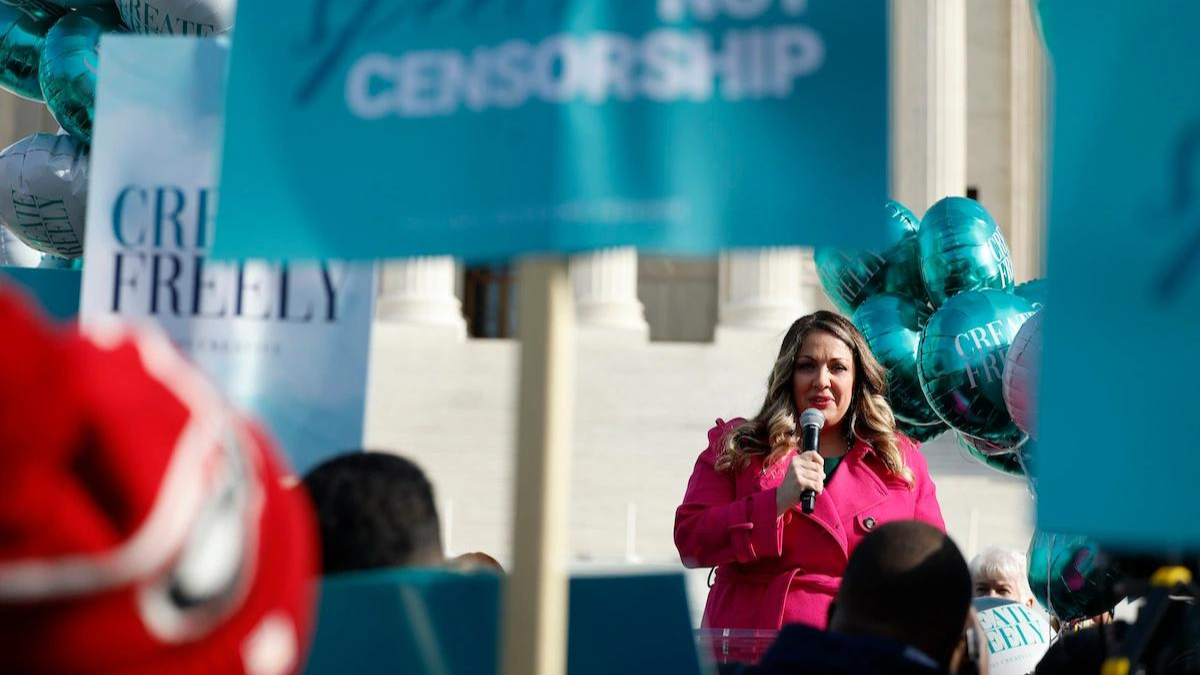

Correcting the Record on 303 Creative
In the wake of the Supreme Court’s important decision in 303 Creative v. Elenis, a lie has been propagated about the case, a lie that purportedly implicates plaintiff Lorie Smith and the Alliance Defending Freedom.
07/13/23
John Stonestreet Maria Baer

Recently, in the wake of the Supreme Court’s important decision in 303 Creative v. Elenis, a lie has been propagated about the case, a lie that purportedly implicates plaintiff Lorie Smith and the Alliance Defending Freedom. Thanks to the willingness of media outlets, public officials, and pundits to repeat these accusations and misrepresent what they mean, this lie has the potential to poison the cultural memory about this critically important case. The accusation is that 303 Creative, the graphic design company at the center of the lawsuit, and ADF invented a fake customer request for a same-sex wedding website and that, because of this deceit, the Court should have never heard the case in the first place.
It’s important to correct the record. Many Christians joined with other champions of free speech to celebrate the Supreme Court’s decision in the 303 case. However, Christians do not believe that the “ends justify the means.” A win derived out of false witness and deception cannot be celebrated. That’s the kind of win that headline after headline has proclaimed. However, that’s not what happened here, as Kristen Waggoner, president and general counsel of ADF, and Erin Hawley, senior counsel of ADF, explained this week in The Wall Street Journal.
The origin of the 303 Creative case dates to 2016, when Lorie Smith, who founded the creative design company four years earlier, wanted to include a disclaimer on her website. Hoping to add custom website design for weddings to her menu of services, she wanted to clarify that, as a Christian believer, she could not create custom wedding websites for “same-sex weddings.” Given the hostility the state of Colorado had leveled at cake baker Jack Phillips, Lorie knew that she’d likely be considered in violation of the state’s broad anti-discrimination law.
With the help of the Alliance Defending Freedom, Lorie and 303 Creative filed a pre-enforcement challenge, a common legal procedure that allows people to challenge a law before they are penalized under it. This procedure recognizes what should be obvious, that free citizens should not have to first be punished under an unconstitutional law before they are able to challenge its constitutionality.
The day after ADF first filed Lorie’s case, Lorie received a request to create a custom wedding website for someone named Stewart, who said he was marrying someone named Mike. ADF included this request as an addendum to 303 Creative’s lawsuit, not as the basis for it, in order to demonstrate that Lorie was under real pressure to violate her beliefs.
From the very beginning of Lorie’s case—from the federal district court in Colorado where ADF first filed the lawsuit, through the 10th U.S. Circuit Court of Appeals, all the way to the Supreme Court—each judge acknowledged that Lorie had both the right and the standing to bring her case as a pre-enforcement challenge. As Waggoner and Hawley wrote in The Wall Street Journal, “Every one of the 12 appellate judges who heard the case agreed that Ms. Smith had standing, and none of their opinions even considered whether she received a request for a same-sex wedding website.” However, just days after the Supreme Court ruled that the First Amendment protects Lorie from state coercion and that she cannot be forced to say something that violates her beliefs, a news outlet alleged that the website request Lorie Smith had received was fake. According to the report, a man claiming to be Stewart, whose address and contact information matched what had been submitted in the 2016 request, denied ever making it.
Immediately, the false memory machine was in motion. Multiple news outlets seized on the accusation, suggesting the case was illegitimate. Even being accused of faking anti-Christian discrimination is often functionally sufficient to be convicted in the court of cultural memory.
The most likely scenario, of course, is that the request was made by an activist who either hoped that it would undermine the 303 Creative case or could be held (as it was) and brought out in case of an unfavorable decision. Still, whether the request came from a legitimate customer, an activist, or ChatGPT is irrelevant because the case was always a pre-enforcement challenge. Critics are free to dislike the ruling, in which case they should take it up with the U.S. Constitution. But they can’t change the facts. In fact, they are also free to express a lie about the case if they choose, though ironically, that’s at least partly due to what the Court ruled in this case they are committed to undermining.
This Breakpoint was co-authored by Maria Baer. For more resources to live like a Christian in this cultural moment, go to breakpoint.org.
Topics
303 Creative
303 Creative v Elenis
discrimination
Freedom of Expression
freedom of religion
Freedom of Speech
Law
SCOTUS
Have a Follow-up Question?
Up
Next

Related Content

© Copyright 2020, All Rights Reserved.













